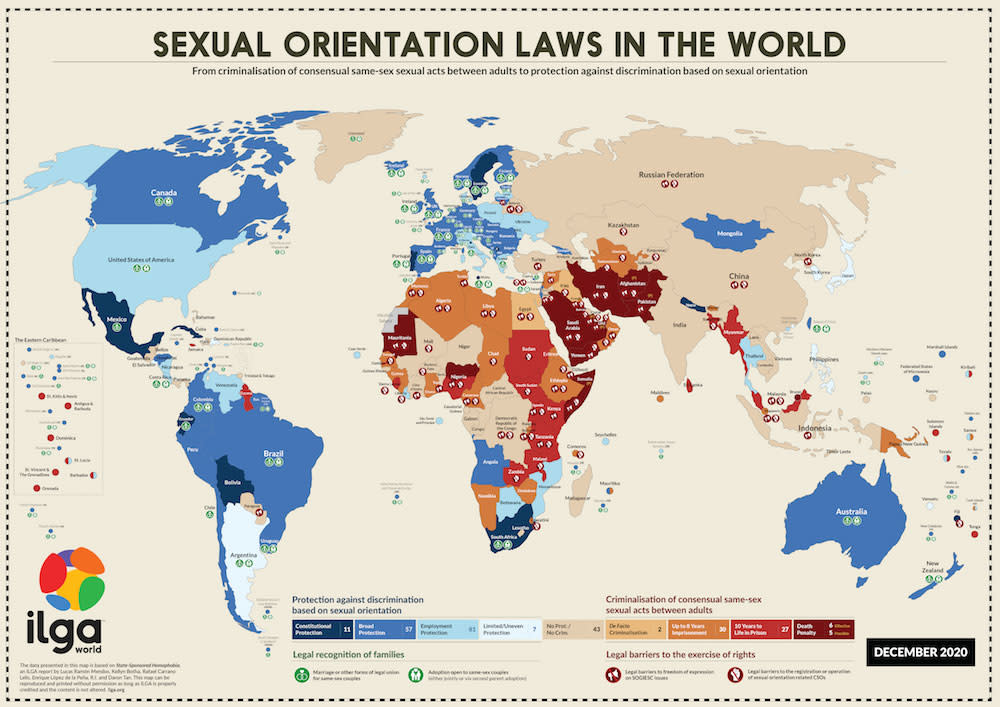Same Sex Marriage Guide
Marriage as an institution has been around for much of recorded history, but it’s only been within the past few decades that governments have started to extend equal access and rights to marriage for same-sex couples. The Netherlands was officially the first country to recognize marriage equality at the national level in the year 2001. Additional countries in Europe later followed suit including Belgium and Spain as the second and third countries. Currently, 36 countries recognize same-sex marriage around the globe. In addition to these 36, there are some countries that also offer partial recognition in various forms.
There are many nuances in the laws and protections afforded (or not afforded) to residents in countries offering some form of legal recognition of partnerships for LGBTQ+ people. Furthermore, some countries may offer limited rights like civil unions or recognizing foreign same-sex marriages, while not actually offering same-sex couples full rights given to a man and a woman who wed within their borders and jurisdiction.
Marriage equality is also referred to using a number of different terms including same-sex marriage, gay marriage or same-sex unions; however, the determining factor is whether the country’s laws treat opposite and same-sex couples equally. Even though some rights and protections being afforded to same-sex couples is progress for the LGBTQ+ community overall, the ultimate goal is full marriage equality.
A Brief History of the Recognition of Same-Sex Relationships
Same-sex relationships have been documented throughout history, but in the vast majority of cultures, those relationships have been viewed negatively within those societies. On the other hand, there is some evidence throughout history that same-sex relationships were not only tolerated in some places but also encouraged. For example, historians have reported various accounts of same-sex relationships between men in Ancient Greece that may have been seen favorably. Other cultures throughout history like some Indigenous Peoples of the Americas as well as places like China, Japan, Papua New Guinea and others have demonstrated some tolerance for these relationships as well in various periods of time. However, by far throughout human history, homophobia has widely been used to shame same-sex relationships — or worse, has been used as the reason to punish those involved. It’s unfortunate but even in today’s global society, homophobia still exists and people in many countries face shame, persecution, punishment, imprisonment or even death as a result of their self-expression.
What Countries Have Legalized Same-sex Marriage?
Currently same-sex marriage is legally performed and recognized in these 36 countries (nationwide or in some jurisdictions): Andorra, Argentina, Australia, Austria, Belgium, Brazil, Canada, Chile, Colombia, Costa Rica, Cuba, Denmark, Ecuador, Estonia, Finland, France, Germany, Greece, Iceland, Ireland, Luxembourg, Malta, Mexico, Netherlands, New Zealand, Norway, Portugal, Slovenia, South Africa, Spain, Sweden, Switzerland, Taiwan, United Kingdom, United States and Uruguay. Whereas, Liechtenstein and Thailand have begun legislation to perform same-sex marriages by early 2025.
Which Countries Criminalize LGBTQ+ Relationships?
Equal marriage laws are at one end of the spectrum, but as of the publication of this article, 61 countries currently have laws that allow for the punishment of same-sex activity between consenting adults. The vast majority of these countries are located in Africa and the Middle East. Even worse, 12 countries allow for those -“crimes” to be punished with the death penalty. The International Lesbian, Gay, Bisexual, Trans and Intersex Association (ILGA) publishes a series of maps annually that show only 65% of those people living in UN countries around the world can now legally be in consensual same-sex relationships. Those same maps also show where homosexuality is criminalized. Some of the worst offenders include Saudi Arabia, Iran, Yemen, Sudan, Somalia and Nigeria, where the death penalty is often imposed across the country as a form of punishment for homosexuality.

Is it Safe to Travel to Countries Where Being LGBTQ+ is Illegal?
Traveling to countries that have anti-LGBTQ+ laws or social views can sometimes be risky or outright dangerous. However, it’s also possible to travel to many of these countries safely in some cases if you follow some precautions. It’s important to point out that every country is different, and it can be difficult to generalize when providing advice. It’s even possible that some regions within the same country may be considered generally safe for LGBTQ+ people, while others distinctly not. For example, Budapest is the capital city of Hungary and has a relatively large and developed LGBTQ+ scene, albeit somewhat ‘underground’ and not visible to the general public. In this sense there is some amount of tolerance within this part of Hungary even if discrimination is commonplace. However, anti-LGBTQ+ rhetoric and sentiment has been on the rise throughout Hungary in recent years, and in smaller towns and the countryside intolerance is now the norm.
Another point to consider for a tourist is one’s ability and comfort in “passing,” or rather their ability to pass as cis/straight or heterosexual. In other words, is a person comfortable and capable of being perceived to not be LGBTQ+ by locals within the destination, thereby avoiding any potential risks or discrimination by those they encounter during their travels? If you’re comfortable and capable of “passing” and keeping your sexual orientation private, it’s likely possible to travel safely with minimal risk to most destinations with anti-LGBTQ+ laws and attitudes. Some LGBTQ+ and allied individuals choose to avoid visiting destinations of this type because they prefer that the economic activity of their visit go towards a country with more favorable laws. With that said, this decision should be made on an individual basis, evaluating the facts and current sentiment and situation of the destination in question.
Sexual orientation and gender identity are complex topics and one’s outward appearance to others may impact someone’s comfort in traveling to a place that is known for being unwelcoming to LGBTQ+ people. While this could apply to any member of the LGBTQ+ community, trans people in particular often face the greatest risk. The best advice when deciding to visit a destination is to do your research in advance. There are a wealth of destinations that are known for being welcoming and tolerant to the LGBTQ+ community so those places may provide the best option for your trip. Still, it’s worth mentioning that some LGBTQ+ people may want to visit well-known or historic places known to be anti-LGBTQ+. The pyramids of Egypt, the beautiful beaches of Jamaica or Kuala Lumpur in Malaysia are just a few examples of incredible experiences to consider. If you do choose to visit destinations like this you may also be able to find LGBTQ+ welcoming hotels, tour operators and tourism businesses who can assist in ensuring your trip is planned with safe and welcoming options.
How Can I Safely Travel to Countries that Might be Considered anti-LGBTQ+?
There are many other destinations where LGBTQ+ people may not be afforded equal rights and where acceptance or tolerance of homosexuality is not widespread. The attitude towards LGBTQ+ people in these countries is not always uniform and acceptance can vary dramatically. Viewpoints are often influenced by religion, age, education, background as well as a multitude of other aspects of life, which are difficult to quantify. If you’re interested in traveling to one of these countries, the first step is to do your research and confirm you will be comfortable traveling to and navigating the destination while there. One of the best ways to ensure you find welcoming tourism and hospitality businesses that welcome the LGBTQ+ community is to find a hotel, tour operator, or other tourism business that is a member of IGLTA. Companies and organizations who join IGLTA agree to a code of conduct stating they will conduct business with honesty, integrity, and fairness with respect to customers, clients, employees, and business associates alike. Each member will protect their customers' or clients' confidentiality and will not discriminate as to sex, race, color, religion, national origin, age, disability status, sexual orientation, gender identity or gender expression. The business owners or management of these companies are usually LGBTQ+ owned or allies of the community and are willing to go out of their way to ensure you are safe and enjoy your stay in their destination.
Marriage Equality, LGBTQ+ Laws, Rights and Social Sentiment
IGLTA has partnered with Destination Pride, a data-driven platform that reimagines the Pride flag as a dynamic bar graph, then uses it to visualize the world's LGBTQ+ laws, rights and social sentiment. The platform brings together thousands of data points from around the globe—including marriage equality laws, census data and real-time social sentiment—to generate a Pride flag visualization for each destination. Click here to learn more. This data is reviewed periodically and updated quarterly to maintain the most current information. If you see any errors or would like to provide any feedback, fill out this form with your request.
Explore Marriage Equality & LGBTQ+ Rights Around the World
Explore Additional LGBTQ+ Rights and Protections
In addition to marriage equality, you can also explore situations for LGBTQ+ people with regards to sexual activity laws, gender identity protections, anti-discrimination laws, civil rights & liberties as well social media sentiment in destinations around the world. Social media sentiment takes a snapshot of the trending conversations on social media and attempts to determine whether the sentiment is positive, neutral or negative. It’s important to note that in some destinations, conversations about LGBTQ+ people may not regularly occur on social media, meaning that there is insufficient data to draw a conclusion. Countries with severe anti-LGBTQ+ laws may fall into this category. In these situations, the algorithm used for social media sentiment will only report a neutral result even if the country is not welcoming to LGBTQ+ people.
What is IGLTA?
The International LGBTQ+ Travel Association is the world's leading network of LGBTQ+ welcoming tourism businesses. We provide free resources and information for LGBTQ+ travelers including travel and safety guides like this one. IGLTA’s members include LGBTQ+ and LGBTQ+-friendly accommodations, destinations, service providers, travel agents, tour operators, events and travel media in more than 80 countries.
